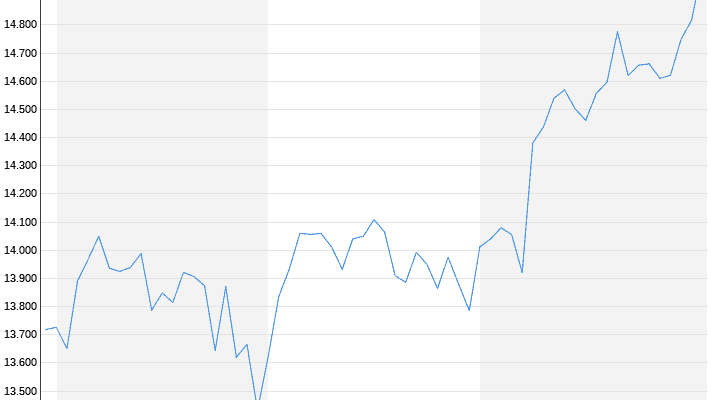Tuesday March 30th 2021
Tailwind from the USA
Dax takes the 15,000 hurdle for the first time
The US reports daily records in its vaccination campaign. That brightens the mood of consumers and points to an economic upturn. The German stock market is pulled in the wake. The stock market barometer is pushing itself to a new high – once again.
Despite the third corona wave, the German leading index Dax rushes from record to record and has jumped the hurdle of 15,000 points for the first time. On the one hand, tailwind came from the USA, where vaccination campaigns are proceeding at a rapid pace and further sentiment data on the part of consumers spread optimism. The economic sentiment in the euro zone improved surprisingly strongly in March. For the first time since the outbreak of the pandemic, the indicator is now slightly above its long-term average. On the other hand, there is strong demand for shares from the domestic auto industry and the interest-sensitive insurance and banking sectors.
The German stock market barometer ended trading with a plus of 1.3 percent to 15,009 points. In the course of time it had risen to 15,030 points. The index has increased by nine and a half percent since the beginning of the year. Since March 2020, the increase has even been a little over 80 percent. A year ago, the corona panic had reached its peak and brought the stock exchanges to their knees within just a month before central banks around the world intervened in monetary policy and governments finally put together billions and even trillions of corona aid packages. The MDax of the medium-sized values closed 0.9 percent higher at 31,728 points.
There was also a strong upward trend across Europe: The Eurozone leading index EuroStoxx rose by 1.1 percent to 3926 points and reached its highest level in 13 years. The Cac 40 in Paris managed to finally make up for its losses from the Corona stock market crash a year ago with a plus of 1.2 percent. By contrast, the UK’s FTSE 100 rose only slightly, while in the USA the most important indices fell moderately at the close of the European stock market.
The automotive, banking and insurance industries were particularly in demand across Europe. The top value in the Dax was the preference shares of Volkswagen with plus 4.7 percent, followed by BMW with plus 3.7 percent. Daimler rose by 3.0 percent and among the banks and insurers were Allianz with plus 2.1 percent and Deutsche Bank with plus 1.6 percent in the course. In the MDax, Commerzbank’s shares rose by 3.3 percent.
Scout24’s share certificates rose by 3.1 percent. The online real estate marketplace intends to use the profit from the sale of its car brokerage platform to buy back its own shares for almost one billion euros. Nordex’s papers, which have only recently been listed in the MDax, rose 4.7 percent. The wind turbine manufacturer received a major order from Spain.
In the SDax small cap index, Westwing shares jumped 5.6 percent. After a surprisingly strong final quarter, the online furniture retailer is now also very optimistic for the first quarter of 2021 and has set itself ambitious goals for the year as a whole.
Is hedge fund hardship depressing the gold price?
The euro fell and was trading at $ 1.1724 at the close of the European market. Analyst You-Na Park-Heger from Commerzbank referred to the tense corona situation in the euro zone as a burden. The European Central Bank set the reference rate in the afternoon at $ 1.1741. The dollar cost 0.8517 euros.
On the bond market, the current yield rose from minus 0.39 percent the previous day to minus 0.33 percent. The Rex bond index fell by 0.30 percent to 144.69 points. The Bund future lost 0.22 percent to 171.18 points in the early evening.
The gold price continued its downward slide and, at 1686 dollars, slipped below the 1700 per troy ounce mark for the first time since March 12. Gold has lost around nine percent since the beginning of the year. Participants see the current sell-off in connection with the turbulence surrounding the hedge fund Archegos Capital Management, which was unable to service margin calls after heavy losses. Involved banks were forced to sell hard. These may have also pushed the gold price down in order to gain liquidity, as Commerzbank expert Daniel Briesemann pointed out.
.
